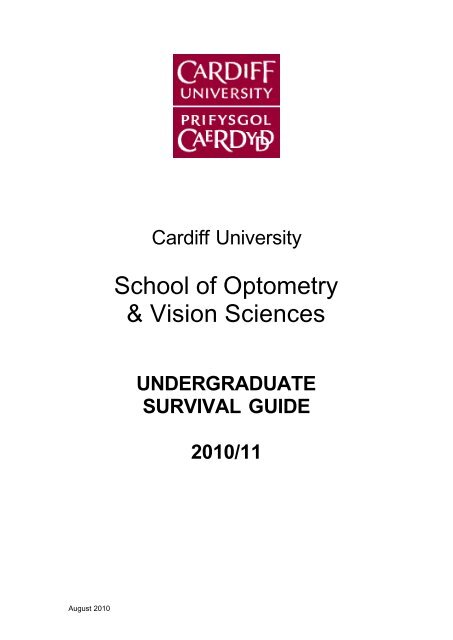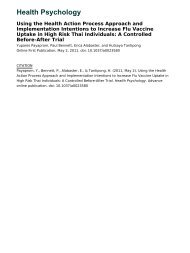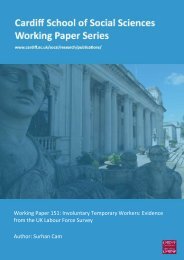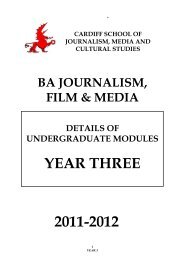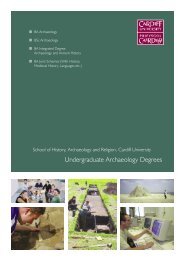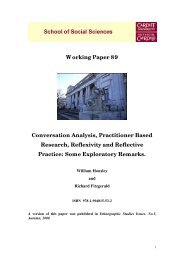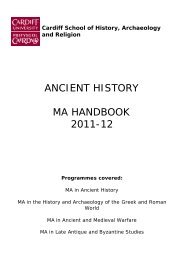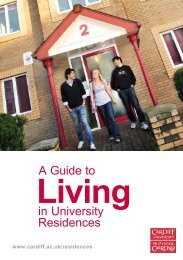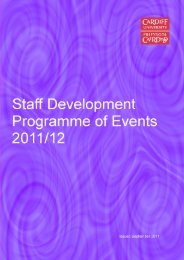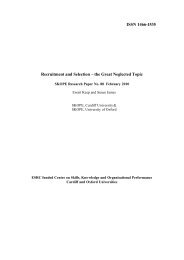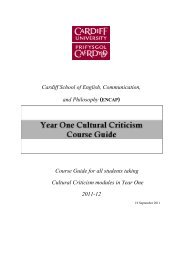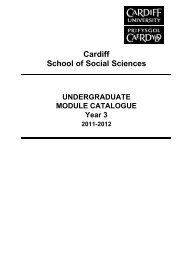School of Optometry & Vision Sciences - Cardiff University
School of Optometry & Vision Sciences - Cardiff University
School of Optometry & Vision Sciences - Cardiff University
You also want an ePaper? Increase the reach of your titles
YUMPU automatically turns print PDFs into web optimized ePapers that Google loves.
<strong>Cardiff</strong> <strong>University</strong><br />
<strong>School</strong> <strong>of</strong> <strong>Optometry</strong><br />
& <strong>Vision</strong> <strong>Sciences</strong><br />
UNDERGRADUATE<br />
SURVIVAL GUIDE<br />
2010/11<br />
August 2010
Contents<br />
1. Introduction<br />
1.1 The Student Handbook<br />
1.2 <strong>School</strong> Website<br />
1.3 Rules and Regulations<br />
2. <strong>School</strong> <strong>of</strong> <strong>Optometry</strong> and <strong>Vision</strong> <strong>Sciences</strong><br />
2.1 The <strong>Optometry</strong> building and facilities<br />
2.2 Who’s Who in <strong>Optometry</strong><br />
3. Learning Resources<br />
3.1 Library Facilities<br />
3.2 Computing<br />
4 Student Support<br />
4.1 Disclosing a learning difficulty, disability, or medical condition<br />
4.2 <strong>School</strong> Support<br />
4.3 The Student Support Centre<br />
5 Studying for the BSc <strong>Optometry</strong><br />
5.1 Study Skills<br />
5.2 Equipment<br />
5.3 Fitness to Practice and the General Optical Council (GOC)<br />
5.4 Safety Policy<br />
5.5 Lockers<br />
5.6 OPSOC – <strong>Optometry</strong> Society<br />
6 What to do when<br />
Appendices<br />
Appendix A<br />
Appendix B<br />
Appendix C<br />
Appendix D<br />
Clinical Dress and Behaviour protocol<br />
Attendance and Absence Protocol<br />
GOC Code <strong>of</strong> Conduct<br />
Draft first year timetable<br />
2
Introduction<br />
This guide will provide you with a range <strong>of</strong> information and advice regarding<br />
being a student in the <strong>School</strong> <strong>of</strong> <strong>Optometry</strong> and <strong>Vision</strong> <strong>Sciences</strong>. In addition to<br />
this, you will also be given a Course Handbook, which focuses more on<br />
academic matters. You will also receive a copy <strong>of</strong> the <strong>University</strong>’s academic<br />
regulations. It is important that you make reference to all <strong>of</strong> these information<br />
resources as this booklet alone is not comprehensive; it is to be used as<br />
a guide.<br />
The information contained within this guide is important, and as such you<br />
must read it carefully. Although it may seem strict in places, we simply want to<br />
ensure that you are equipped with all the information that you will need to<br />
successfully progress along your studies in <strong>Optometry</strong>. We want to give you<br />
the best possible chance <strong>of</strong> succeeding in your studies, and following the<br />
advice in this booklet is a sure way <strong>of</strong> doing so. This guide is intended to help<br />
you and does not replace the <strong>of</strong>ficial documents that you will have been given.<br />
As we stress many times throughout this guide, if you are unsure about<br />
anything, please ask a member <strong>of</strong> staff.<br />
Please keep this information safe for the duration <strong>of</strong> your studies. Staff are<br />
always willing to help but this guide is intended to provide a quick answer to a<br />
query.<br />
1.1 The <strong>School</strong> Website<br />
The <strong>School</strong> has its own website, which can be accessed at<br />
www.cardiff.ac.uk/optom. It contains a wide range <strong>of</strong> information about the<br />
<strong>School</strong>. Connection to the <strong>School</strong>’s learning web pages (Blackboard) can also<br />
be made from here.<br />
1.2 Rules and Regulations<br />
Being a student gives you a lot <strong>of</strong> freedom to study when it suits you but with<br />
the freedom comes responsibility. There are certain rules that must be<br />
followed whilst you are a student at <strong>Cardiff</strong> <strong>University</strong>. The Academic<br />
Regulations Handbook can be found at<br />
http://www.cardiff.ac.uk/regis/sfs/regs/index.html. You should also consult the<br />
Course Handbook for further advice on rules and regulations. If you have any<br />
queries, please see your Personal Tutor.<br />
Attendance<br />
Attendance at Clinics, Practical and Laboratory Classes is compulsory. All<br />
absences must be reported on the Absence Form available from the <strong>School</strong><br />
Office. Absences on medical grounds may also require a note from your<br />
medical practitioner.<br />
3
Failure to attend a laboratory or practical will result in the penalty <strong>of</strong> a 5%<br />
reduction in the final total mark for that module. Exemption can only be given<br />
by the Examining Board on submission <strong>of</strong> an absence form, a doctor’s note or<br />
extenuating circumstances via the <strong>School</strong> Office (please see later notes on<br />
special circumstances).<br />
Failure to attend any clinic (except for certified medical reasons), without prior<br />
permission from a tutor, will result in an automatic suspension from all clinics.<br />
In this period, the student must consult with the Head <strong>of</strong> <strong>School</strong> and the<br />
Director <strong>of</strong> Teaching.<br />
The <strong>School</strong> has an attendance protocol which you MUST read. Please refer to<br />
Appendix B.<br />
Dress Code<br />
Please be aware that <strong>Optometry</strong> is a pr<strong>of</strong>ession, and as such, it is important<br />
that you dress appropriately when representing the pr<strong>of</strong>ession in clinical<br />
settings. It is also important that you dress appropriately for laboratory work to<br />
maintain your safety. The dress code for the BSc <strong>Optometry</strong> is included as<br />
Appendix A, which outlines the dress requirements for various activities.<br />
Every student MUST read and take note <strong>of</strong> the dress code as a matter <strong>of</strong><br />
priority. There is a penalty for those who fail to attain the required standard.<br />
Special Circumstances<br />
None <strong>of</strong> us expect to have trouble with our studies, but if you have suffered<br />
circumstances that you feel have affected your performance during the year,<br />
or may affect your performance in examinations, these circumstances MUST<br />
be given in writing, including any medical notes and other supporting<br />
information, to the <strong>School</strong> Office BEFORE the examination takes place.<br />
Submissions after the event may be dismissed by the <strong>School</strong>. It is also<br />
advised that you talk to your Personal Tutor.<br />
A receipt should be obtained from the <strong>School</strong> Office for any submission <strong>of</strong><br />
special circumstances.<br />
If the problem is ongoing, you MUST have a medical note.<br />
Please refer to the Course Handbook for further details regarding special<br />
circumstances.<br />
4
.<br />
2. <strong>School</strong> <strong>of</strong> <strong>Optometry</strong> and <strong>Vision</strong> <strong>Sciences</strong><br />
2.1 The <strong>Optometry</strong> Building and Facilities<br />
The contact details for the <strong>School</strong> are as follows:<br />
<strong>School</strong> <strong>of</strong> <strong>Optometry</strong> and <strong>Vision</strong> <strong>Sciences</strong><br />
<strong>Cardiff</strong> <strong>University</strong><br />
Maindy Road<br />
Cathays<br />
<strong>Cardiff</strong><br />
CF24 4LU<br />
Telephone: +44 (0)29 20 874374<br />
Please note that Smoking is not permitted inside any <strong>of</strong> the <strong>University</strong><br />
buildings. If you are smoking outside, please keep well clear <strong>of</strong> the doors to<br />
the main entrance and the front <strong>of</strong> the building.<br />
Catering<br />
There is a small c<strong>of</strong>fee shop located within the atrium <strong>of</strong> the <strong>Optometry</strong><br />
building, near to the main entrance. You can purchase a variety <strong>of</strong> snacks and<br />
hot and cold drinks from here. During semester time, the opening times are:<br />
Monday, Tuesday & Thursday 8.30am to 4.00pm<br />
Wednesday 8.30am to 3.30pm<br />
Friday 9.00am to 3.00pm<br />
A drinks vending machine can be found in the atrium near the lockers.<br />
Car Parking<br />
Please note that the car park that sits alongside the <strong>Optometry</strong> Building is for<br />
eye clinic patients and authorised staff only, and is not available for use by<br />
students.<br />
Toilets<br />
Toilets can be found on each floor <strong>of</strong> the building, including disabled toilets.<br />
Personal Messages and the Undergraduate Pigeonholes<br />
Personal messages will be left for you in the undergraduate pigeonholes<br />
found in the Undergraduate Computing Laboratory. The pigeonholes are<br />
arranged in alphabetical order, by surname, and any messages that arrive in<br />
the <strong>School</strong> for you, including letters from the library, will be placed there.<br />
Please check your pigeon holes regularly so that you do not miss out on any<br />
vital information.<br />
5
2.2 Who’s Who in <strong>Optometry</strong><br />
Pr<strong>of</strong>essor Tim Wess<br />
Head <strong>of</strong> <strong>School</strong><br />
Pr<strong>of</strong>essor Rachel North Deputy Head <strong>of</strong> <strong>School</strong><br />
Dr Paul Murphy<br />
Director <strong>of</strong> Learning and Teaching<br />
Dr Fergal Ennis<br />
Deputy Director <strong>of</strong> Learning and Teaching<br />
Mr Richard Earlam<br />
Admissions Tutor<br />
Dr Christine Purslow<br />
Deputy Admissions Tutor<br />
Dr Tom Margrain<br />
Director <strong>of</strong> Clinics<br />
Dr Maggie Woodhouse Exams Convenor<br />
Mrs Leanne Morrish Secretary (Maternity leave until June 2011)<br />
Mrs Sue Hobbs<br />
Secretary<br />
Ms Katrina Lougher<br />
Clerical Assistant<br />
For a comprehensive list <strong>of</strong> all staff in the <strong>School</strong>, please visit<br />
www.cardiff.ac.uk/optom/contactsandpeople.<br />
3.1 Library Facilities<br />
3. Learning Resources<br />
The <strong>Optometry</strong> collection is located within the Bute Library, which can be<br />
found in the Bute Building (no. x on the map enclosed):<br />
Arts and Social Studies Library<br />
Column Drive<br />
<strong>Cardiff</strong><br />
CF10 3EU<br />
Telephone: 029 2087 4818<br />
Email: buteliby@cardiff.ac.uk<br />
You will be given an introduction to library and computing facilities during<br />
Freshers week at the beginning <strong>of</strong> term. Further information regarding use <strong>of</strong><br />
the libraries can be found at http://www.cardiff.ac.uk/insrv/libraries/index.html.<br />
3.2 Computing<br />
The <strong>School</strong> has a computer room for <strong>Optometry</strong> students only, which can be<br />
found on the first floor <strong>of</strong> the building. You will require your <strong>University</strong><br />
username and password to log on to the computers. This will be given to you<br />
during Fresher’s week (please see enclosed Fresher’s timetable). For details<br />
<strong>of</strong> other computing facilities around the <strong>University</strong>, please visit<br />
http://www.cardiff.ac.uk/insrv/it/index.html.<br />
6
Access to the room is gained by holding your student ID card against the<br />
reader.<br />
Please note that you must not use personal email addresses to communicate<br />
with the <strong>University</strong>, and must use the <strong>Cardiff</strong> <strong>University</strong> email address that you<br />
have been given.<br />
Blackboard<br />
Blackboard is <strong>Cardiff</strong> <strong>University</strong>'s Virtual Learning Environment (VLE). This is<br />
a web-based application that enables lecturers to provide on-line support for<br />
teaching and learning by, for example:<br />
• Providing on-line teaching resources (e.g. lecture notes);<br />
• Structuring on-line class activities (e.g. using discussion groups);<br />
• Conducting on-line assessments (e.g. creating multiple choice<br />
tests).<br />
To access Blackboard, go to http://cue.cf.ac.uk and log-in using your standard<br />
<strong>Cardiff</strong> username and password. Your lecturers will give you further<br />
information about the resources that they post on Blackboard.<br />
4. Student Support<br />
4.1 Disclosing a Learning Difficulty, Disability or Medical<br />
Condition<br />
<strong>Cardiff</strong> <strong>University</strong> is committed to providing support for disabled students to<br />
enable them to study and work alongside their non-disabled peers. In order to<br />
provide this support, members <strong>of</strong> the <strong>University</strong> may need to share<br />
information regarding your specific needs. You are therefore invited to<br />
disclose any learning difficulty, disability or medical condition to us at any<br />
time. The purpose <strong>of</strong> this is that it helps us to respond to your needs.<br />
New students with a learning difficulty, disability or medical condition have<br />
already been invited to declare them when completing their UCAS application<br />
forms. However, where a new need has arisen (for example, through an<br />
accident) you are invited to report to the Director <strong>of</strong> Learning and Teaching so<br />
that we can, where possible, support you in the most appropriate manner. The<br />
<strong>School</strong> has also developed an Inclusive Curriculum document, which outlines<br />
the steps taken by the <strong>School</strong> to ensure that the BSc <strong>Optometry</strong> is available to<br />
all, regardless <strong>of</strong> disability, gender, sexual orientation, race or creed.<br />
7
4.2 <strong>School</strong> Support<br />
If you have any personal worries or problems which might affect your learning<br />
progress you should report these to your Personal Tutor. You can ask him/her<br />
to treat any information you give him/her as confidential and this<br />
confidentiality will be respected.<br />
Personal Tutors<br />
All students are allocated a Personal Tutor who will help and support you for<br />
the duration <strong>of</strong> your programme. It is important that you get to know your<br />
Personal Tutor, particularly if you encounter personal or academic challenges<br />
which can interfere with your studies. After all, your Personal Tutor speaks for<br />
you in an Exam Board. All students are urged to meet their personal tutor at<br />
the start <strong>of</strong> term as a matter <strong>of</strong> courtesy.<br />
Module Leaders<br />
Module Leaders are responsible for the organisation and administration <strong>of</strong><br />
their respective part <strong>of</strong> the course. This will involve organising academic<br />
modules, collecting feedback from students and staff regarding an academic<br />
module and administration regarding students during that module, such as<br />
attendance records. You will be informed <strong>of</strong> the names <strong>of</strong> Module Leaders at<br />
the beginning <strong>of</strong> each academic year.<br />
Buddies<br />
To help you integrate into <strong>University</strong> life and the ways <strong>of</strong> the <strong>School</strong>, you will<br />
be allocated two buddies, one from each <strong>of</strong> the second and third years, who<br />
you should try to meet during Fresher’s week.<br />
4.3 The Student Support Centre<br />
The Student Support Centre <strong>of</strong>fers a full range <strong>of</strong> confidential help, advice and<br />
support from trained pr<strong>of</strong>essional staff on a range <strong>of</strong> issues. There is a centre<br />
at 50 Park Place and at Cardigan House at the Heath Park Campus. For<br />
further information about what the Student Support Centre <strong>of</strong>fers, please visit<br />
http://www.cardiff.ac.uk/studentsupport/index.html.<br />
8
5.1 Study Skills<br />
5. Studying for the BSc <strong>Optometry</strong><br />
Well done, you have made it to <strong>Optometry</strong>! Now you plan to fly your way<br />
through the course, enjoying <strong>University</strong> life, emerging with an <strong>Optometry</strong><br />
degree. But, have you thought about how you will actually do all <strong>of</strong> this? The<br />
challenge before you has many facets; you need time to study and time to<br />
relax. Have you considered how you will balance all <strong>of</strong> these demands?<br />
The first thing required is to plan your study time, making the best use <strong>of</strong> the<br />
opportunities available. The <strong>School</strong> will give you lectures/practicals, labs and<br />
clinics, but in the end, it is your responsibility. To help you, we have arranged<br />
a series <strong>of</strong> lectures in the first semester on study skills.<br />
5.2 Equipment<br />
Clinical Equipment and Laboratory Coats<br />
You will need a long laboratory coat for use in practical classes and a short<br />
white coat for clinics. You should remember that the wearing <strong>of</strong> your<br />
laboratory/white coat is compulsory when in the lab/clinic. You will also need<br />
to buy some equipment and instruments during your three years <strong>of</strong> study, and<br />
the <strong>Optometry</strong> Society (OPSOC) and the <strong>School</strong> work together to help you<br />
with this.<br />
Start <strong>of</strong> 1st Year (By end <strong>of</strong> Week 2)<br />
White lab + clinic coats – short with long sleeves, large pockets and name<br />
badge.<br />
Trial frame<br />
Starter pack including:<br />
· Cross-cyls (±0.25 and ±0.50)<br />
· Sphere twirls (±0.25/±0.50/±1.00)<br />
· Pen Torch<br />
· Tape Measure<br />
· Budgie Stick<br />
· Black opaque occluder<br />
· Frosted occluder<br />
9
· City or ABDO rule<br />
· Micr<strong>of</strong>ibre lens cloth<br />
· Gross perimetry target (5mm white/15mm red)<br />
The <strong>School</strong> has made arrangements with a local company to supply these<br />
starter packs at the beginning <strong>of</strong> the semester. There is no need for you to<br />
source this kit before you arrive.<br />
End <strong>of</strong> 1st Year / Start 2nd Year<br />
Ophthalmoscope<br />
Retinoscope<br />
There is an instrument fair usually in the second semester <strong>of</strong> your first year so<br />
that these can be purchased in preparation for your second year.<br />
2nd Semester 2nd Year<br />
Volk lens<br />
Advice on ordering equipment<br />
<strong>Optometry</strong> is a highly specialised pr<strong>of</strong>ession and so suppliers do not generally<br />
keep a large amount <strong>of</strong> stock on hand – this can mean that orders take a long<br />
time to arrive, especially at peak times <strong>of</strong> the year. Therefore, it is very<br />
important to order your equipment well before you are likely to need it.<br />
Though many trial frames look the same at first, there is a vast difference in<br />
quality. Please remember that “you get what you pay for”, so avoid ordering<br />
frames at “too good to be true” prices from the internet – these can be poor<br />
quality imitations <strong>of</strong> well known brands. A list <strong>of</strong> recommended frames and<br />
reputable suppliers will be circulated in class at the beginning <strong>of</strong> term to help<br />
you choose the right trial frame for you. It is your responsibility to ensure that<br />
the cubicle is left tidy and this will be checked before you leave.<br />
5.3 Fitness to Practice and the General Optical Council (GOC)<br />
All optometry students must register with the UK’s General Optical Council<br />
(GOC) – this is a legal requirement. Not only do you have to do this when you<br />
start the course, but you will also need to renew your registration in July every<br />
year. The penalty for not maintaining registration is not just financial - it can<br />
have serious consequences for your training, as you would not be able to<br />
carry out any clinical work.<br />
One <strong>of</strong> the conditions <strong>of</strong> this registration is that you must declare all criminal<br />
convictions, cautions and disciplinary proceedings on your registration and<br />
10
annual retention form. This includes minor misdemeanours, but not road<br />
traffic <strong>of</strong>fences dealt with by way <strong>of</strong> a fixed penalty notice.<br />
In line with this requirement, students from 2010 onwards are subject to the<br />
condition that remaining on the degree programme is subject to a satisfactory<br />
Enhanced Criminal Records Bureau Disclosure (CRB Check) when you start,<br />
or, if you join us from overseas, a Certificate <strong>of</strong> Good Conduct.<br />
Throughout your time with us, you are expected to disclose anything that may<br />
affect your fitness to practice as soon as it arises. The <strong>School</strong> is willing to<br />
advise you if you are unsure about whether you have relevant convictions or<br />
conditions that may affect your fitness to practise – in the first instance please<br />
contact Richard Earlam or Christine Purslow. Administrative support for CRBs<br />
is provided by Katrina Lougher in the <strong>School</strong> Office.<br />
5.4 Safety Policy<br />
The <strong>University</strong> and <strong>School</strong> alike consider the safety <strong>of</strong> its students, staff and<br />
patients to be <strong>of</strong> prime importance. The measures taken to ensure safety are<br />
described in the <strong>School</strong> Safety Policy document. A copy for viewing by any<br />
student or staff member is kept in the <strong>School</strong> Office. The document is<br />
prepared and maintained by the <strong>School</strong> Safety Committee. Any queries<br />
regarding safety should be addressed to one <strong>of</strong> the members <strong>of</strong> this<br />
committee. Dr Gill Smith is the <strong>School</strong>’s Safety Officer<br />
(SmithGM@<strong>Cardiff</strong>.ac.uk), and Chair <strong>of</strong> the <strong>School</strong>’s Safety Committee.<br />
You are advised to note carefully any specific information you receive on<br />
safety matters, for example the hazard signs on doors to laboratories and<br />
clinics and particularly the safety information in your laboratory and clinic<br />
manuals. You are also advised to remember the position <strong>of</strong> safety devices;<br />
eye-washes, fire blankets, fire extinguishers, fire alarms etc. so you can<br />
access them quickly in an emergency.<br />
You should also note the fire exits from the building and that in the event <strong>of</strong> a<br />
fire alarm (a continuous ringing <strong>of</strong> the alarm bell) you should exit the building<br />
IMMEDIATELY and assemble outside the main entrance <strong>of</strong> the <strong>Optometry</strong><br />
Building - please do not block the doors.<br />
The <strong>University</strong> Health Centre is available to you on matters <strong>of</strong> personal health,<br />
although you are still required to register with a local GP.<br />
Please remember that you are responsible for the safety <strong>of</strong> others and<br />
others are responsible for your safety, and you should always behave in a<br />
manner that does not compromise the safety <strong>of</strong> either yourself or others. It<br />
should be noted that in matters <strong>of</strong> Health and Safety, (legal) responsibility lies<br />
with the individual.<br />
A presentation on Safety Matters will be given to you early in the Semester –<br />
your attendance is compulsory.<br />
11
5.5 Lockers<br />
Lockers are available for all students to store their bags and valuables whilst<br />
in the building. A returnable deposit is required. You will be given more<br />
information about locker keys during Fresher’s week. No bags or coats should<br />
be taken to labs/practicals.<br />
5.6 OPSOC – <strong>Optometry</strong> Society<br />
OPSOC is the <strong>Cardiff</strong> optometry society, run by a committee <strong>of</strong> third years<br />
and social secretaries from second year. We run the social end <strong>of</strong> things<br />
within the course, organising all nights out and trips within Wales and abroad,<br />
and the cheese and wine evenings where optical companies come in to chat<br />
about their jobs or equipment-and most importantly-the free wine and pizza!<br />
OPSOC is a huge part <strong>of</strong> the scene while doing a degree in optometry at<br />
<strong>Cardiff</strong> and we pride ourselves on being the best opsoc out <strong>of</strong> all the<br />
optometry universities in the UK. Through the fun that we have, it gives a<br />
great basis to build friendships within the course and there is never a dull<br />
moment. We run our own fresher’s week to complement that <strong>of</strong> the main<br />
university and this involves challenge days, fancy dress socials and walks<br />
around the beautiful areas in <strong>Cardiff</strong>.<br />
All students are advised to sign up, and membership for one year is paid at<br />
the start <strong>of</strong> term and gives free access to all socials and massive discounts to<br />
annual Christmas and Eye Balls, along with discounts on opsoc hoodies and<br />
t-shirts throughout the year.<br />
Please see our facebook group and the society noticeboard in the optometry<br />
building for all news and events J<br />
12
6. What to do when…<br />
You have a personal<br />
problem<br />
You have a problem<br />
with your studies<br />
Speak to your Personal Tutor as soon as is<br />
conveniently possible, who can talk things through<br />
with you. The Student Support Centre is also<br />
available to help support you with personal<br />
problems, as mentioned earlier.<br />
In the first instance, talk to the module leader. You<br />
can also talk to your Personal Tutor, Director <strong>of</strong><br />
Learning and Teaching, or the Head <strong>of</strong> <strong>School</strong>.<br />
You need to be absent<br />
from the course<br />
You must contact the <strong>School</strong> Office as soon as<br />
possible to record the absence and explain the<br />
reason.<br />
You are ill (i) During Examinations: it is important that if<br />
you are ill, or have any other reason why<br />
your performance during examinations<br />
may be affected, you obtain a Doctor’s<br />
certificate and submit it to the <strong>School</strong> Office<br />
preferably before the exams or as soon as<br />
possible after.<br />
(ii)<br />
During Semester Time: if you are absent<br />
from the course during semester time<br />
due to illness you need to complete a<br />
‘Personal Absence Certificate’. This must be<br />
completed and submitted on the first day<br />
you return to the <strong>School</strong>. Forms are<br />
available from beside the student<br />
pigeonholes or from the <strong>School</strong> Office. For<br />
absences seven consecutive calendar<br />
days or longer, you must also produce a<br />
doctor’s certificate. Should you be absent<br />
due to illness in excess <strong>of</strong> twenty-eight<br />
days, the <strong>School</strong> is required to notify the<br />
Director <strong>of</strong> Registry. It is also important that,<br />
for circumstances <strong>of</strong> prolonged illness, you<br />
maintain good communication with your<br />
Personal Tutor. You must obtain a receipt<br />
upon submission <strong>of</strong> special circumstances.<br />
You have financial<br />
difficulties<br />
The financial support team within the <strong>University</strong><br />
manage a variety <strong>of</strong> funds which can help students<br />
who are having financial difficulties, budgeting or<br />
covering specific costs during their time at<br />
university. Further details can be found at<br />
http://www.cardiff.ac.uk/financialsupport/index.html.<br />
13
You change your name<br />
or address<br />
You must inform one <strong>of</strong> the Senior Tutors (Mr<br />
Richard Earlam or Dr Fergal Ennis) and the <strong>School</strong><br />
Office if you change your term time address or<br />
home address. There is a standard form to<br />
complete and copies <strong>of</strong> the form can be found<br />
beside the student pigeonholes or obtained from<br />
the <strong>School</strong> Office. Completed forms should be<br />
handed in to the Undergraduate Secretary.<br />
Occasionally, a student will change their name. If<br />
you do, you must complete the same change <strong>of</strong><br />
name/address form and hand it in to the <strong>School</strong><br />
Office, who will then inform the Academic Registry.<br />
You want to withdraw<br />
from the degree<br />
If, for any reason, you wish to withdraw from the<br />
degree or need to interrupt your studies, you must<br />
see your Personal Tutor and/or one <strong>of</strong> the Senior<br />
Tutors (Mr Richard Earlam or Dr Fergal Ennis).<br />
You may also need to speak with the Head <strong>of</strong><br />
<strong>School</strong> or Director <strong>of</strong> Teaching. It is important to<br />
do this as it could have a bearing on any future<br />
opportunities you may wish to take in Higher<br />
Education. Advice is also available from the<br />
Student Support Centre.<br />
Please do not suffer in silence! If you have any kind <strong>of</strong> problem, please come<br />
and tell us. We can only help if we are fully informed.<br />
14
Appendix A<br />
Clinical Dress and Behaviour<br />
Introduction<br />
Laboratory Dress and Behaviour<br />
Introduction<br />
Guidelines for Laboratory Dress and Behaviour should follow those set out for<br />
Clinical Dress and Behaviour above. The importance <strong>of</strong> health and safety<br />
whilst attending a practical session within the laboratory cannot be<br />
understated. All our students are representatives <strong>of</strong> the <strong>School</strong> and the<br />
<strong>University</strong> and are therefore responsible for the health and safety <strong>of</strong><br />
themselves and everyone else they come into contact.<br />
In order to meet the requirements <strong>of</strong> the Health and Safety at Work Act, and<br />
the COSSH regulations, a number <strong>of</strong> rules regarding laboratory practice<br />
MUST be adhered to. You must always remember that your safety is the<br />
responsibility <strong>of</strong> those sharing your work environment. Likewise, you are<br />
responsible for their safety. Even in your status as students, you can be<br />
prosecuted for negligence.<br />
Laboratory Dress Code<br />
Please read guidelines carefully as students not wearing appropriate clothing<br />
will be asked to leave the laboratory.<br />
Long sleeved, long length laboratory coats must be worn at all times:<br />
buttoned/zipped up to cover other clothing. Safety spectacles and gloves must<br />
be worn when appropriate, and always if stated by lab supervisors.<br />
Long hair should be tied back. Outside hats or scarves should not be worn in<br />
the laboratory. Headscarves should not be worn outside <strong>of</strong> lab coats, but<br />
enclosed within the lab coat for safety reasons. Any jewellery, such as<br />
watches or necklaces, must be worn beneath the lab coat to avoid<br />
contamination. Bracelets and any jewellery that cannot be covered by the lab<br />
coat are not recommended as they are likely to be a source for potential<br />
contamination <strong>of</strong> hazardous materials.<br />
All bags and coats must be left in your lockers. Bring only items you needed<br />
for the session into the laboratory. Remember, no food or drink can be<br />
brought into the laboratory. Shoes should be practical and should not be<br />
open-toed e.g. sandals, flip flops.<br />
Conduct whilst in the laboratory:<br />
As in the clinics, you should conduct yourself in a pr<strong>of</strong>essional manner whilst<br />
attending laboratory sessions. You should work safely whilst in the laboratory<br />
and follow health and safety guidelines associated with each practical session<br />
you are conducting. Your attention is drawn to the hazard warning signs on<br />
15
laboratory doors; you must obey their instructions. If you are unsure <strong>of</strong> their<br />
meanings, please ask.<br />
Whilst carrying out experiments all hazardous materials must be handled with<br />
care and disposed <strong>of</strong> appropriately. Your lab supervisors and practical<br />
handbooks will provide guidance for this. When working with animal tissue,<br />
every precaution must be taken to minimise risk. Wear gloves which must be<br />
disposed <strong>of</strong> in the Bio-Hazard bags. All areas must be cleaned and<br />
disinfected after your use and all materials, tissues etc. must be placed in the<br />
appropriate BIO-Hazard containers. Mouth pipetting in the laboratory is<br />
forbidden.<br />
At the end <strong>of</strong> the experiment, clean up after yourselves. Ask your lab<br />
supervisor if you are unsure how to do this.<br />
All accidents, however minor, must be reported to the staff member in charge<br />
<strong>of</strong> the class at the time <strong>of</strong> the incident.<br />
Food<br />
In all sessions, there must be NO smoking, NO eating and NO drinking,<br />
including chewing gum or drinking bottled water!<br />
Drug Taking<br />
In order to provide a safe environment for patients, the staff <strong>of</strong> the <strong>School</strong>, and<br />
the other students, the misuse <strong>of</strong> drugs is prohibited. This includes over the<br />
counter medicines, alcohol and illegal drugs. Students must present<br />
themselves to all clinical experiences in both a mentally and physically fit<br />
condition.<br />
Hand washing<br />
If collecting samples or taking readings from fellow students, please follow<br />
guidelines for ‘Hand Washing as set out above.<br />
At the end <strong>of</strong> each laboratory session, hands should be thoroughly washed<br />
with the solutions provided in the laboratory for hand washing, before leaving<br />
the laboratory. Please let the lab supervisors know if you think you are allergic<br />
or may be sensitive to this hand wash.<br />
THEFT<br />
Removal <strong>of</strong> any item from the laboratory (or anywhere else), i.e. needles,<br />
syringes, tissues, or equipment, will constitute a theft and may lead to your<br />
expulsion from the <strong>University</strong>.<br />
16
Attendance and Absence<br />
Appendix B<br />
These procedures apply to all undergraduate students registered in the<br />
<strong>School</strong> <strong>of</strong> <strong>Optometry</strong> and <strong>Vision</strong> <strong>Sciences</strong>, and should be read in conjunction<br />
with the Student Absence Procedures for <strong>Cardiff</strong> <strong>University</strong>.<br />
Short Term Absence:<br />
http://www.cardiff.ac.uk/schoolsanddivisions/divisions/regis/sfs/regs/absence.html<br />
Interruption to Studies:<br />
http://www.cardiff.ac.uk/for/current/study/index.html<br />
The <strong>School</strong> <strong>of</strong> <strong>Optometry</strong> and <strong>Vision</strong> <strong>Sciences</strong> expects all students to comply<br />
with <strong>University</strong> procedures regarding absence, and with these supplementary<br />
regulations and procedures.<br />
Student Absence Procedures<br />
General Expectations<br />
The <strong>School</strong> <strong>of</strong> <strong>Optometry</strong> and <strong>Vision</strong> <strong>Sciences</strong> requires all students to attend<br />
for the full duration <strong>of</strong> the published session dates. Students must return from<br />
annual leave in time for the first <strong>of</strong>ficial day <strong>of</strong> study and must not arrange to<br />
take leave prior to the end <strong>of</strong> term.<br />
Specific <strong>School</strong> <strong>of</strong> <strong>Optometry</strong> and <strong>Vision</strong> <strong>Sciences</strong> Expectations<br />
Students are required to attend all practical sessions. This also includes the<br />
clinical activity within the <strong>University</strong> Eye Clinics, and the seminars arranged<br />
immediately prior to or following clinical sessions. Student attendance is<br />
routinely monitored.<br />
If there are absences without explanation, students will be invited to meet with<br />
the Director <strong>of</strong> Teaching and/or the Head <strong>of</strong> <strong>School</strong>.<br />
Students experiencing difficulties with attendance are strongly advised<br />
to discuss their personal circumstances with their Tutor or the Director<br />
<strong>of</strong> Teaching. (Do not wait until disciplinary procedures take place).<br />
Absence due to illness/medical circumstances<br />
Completed Student Absence Forms for illness or other medical conditions<br />
should be given to the <strong>Optometry</strong> <strong>School</strong> Office. Forms can be collected<br />
from the <strong>School</strong> Office or student noticeboards. Self-certification <strong>of</strong> illness is<br />
permitted for absences up to seven consecutive days, but a medical note<br />
should be provided, when possible, to support the paperwork. Applications<br />
for illness as an extenuating circumstance for examinations must include a<br />
medical note.<br />
Unexpected sickness must be reported to the <strong>Optometry</strong> <strong>School</strong> Office<br />
immediately – 029 2087 9048 or 029 2087 4374. It is expected that, unless<br />
there are extenuating circumstances, students should contact the Office<br />
17
themselves. If you have an Eye Clinic session scheduled, then it is required<br />
that you also contact the Clinic Reception – 029 2087 4357 – since there will<br />
be a patient booked in for you.<br />
Should the illness be prolonged beyond three days duration, the student must<br />
inform the <strong>School</strong> Office.<br />
Anticipated absence must be agreed beforehand with the Director <strong>of</strong><br />
Teaching using the Personal Absence Form and countersigned by the Module<br />
Leader. It is essential that the Eye Clinic Reception be informed <strong>of</strong> your<br />
absence when a clinical session will be missed, as soon as the <strong>School</strong> has<br />
agreed the absence.<br />
Records <strong>of</strong> Attendance<br />
The <strong>Optometry</strong> <strong>School</strong> <strong>of</strong>fice and the Module leaders keep records <strong>of</strong> student<br />
attendance at practicals/clinics. Module Leaders maintain comprehensive<br />
and accurate records <strong>of</strong> student attendance and forward the information to the<br />
Director <strong>of</strong> Teaching who co-ordinates the management <strong>of</strong> student absence<br />
and leave.<br />
Student attendance will be considered by the Examination Board when<br />
reviewing student awards and progression.<br />
Responsibilities <strong>of</strong> Staff<br />
All staff (full and part-time) have a duty to attend their scheduled sessions on<br />
time and be properly prepared.<br />
Staff should treat students with politeness and respect. This includes<br />
informing the students if they have to leave or are unable to attend a teaching<br />
session. Pr<strong>of</strong>essional courtesy also requires that students know how long<br />
they anticipate being away, where possible.<br />
Students may report staff absences to the <strong>Optometry</strong> <strong>School</strong> Office; the<br />
<strong>School</strong> Office will then inform the Director <strong>of</strong> Teaching.<br />
If staff anticipate being absent from a scheduled session in advance, they<br />
should make arrangements for appropriate cover, or re-schedule the session<br />
(via the <strong>Optometry</strong> <strong>School</strong> Office) at a time that is convenient for the students.<br />
Students must be made aware when teaching is re-scheduled. The Module<br />
Leader, the <strong>Optometry</strong> <strong>School</strong> Office and, where relevant the Director <strong>of</strong><br />
Teaching, should be informed when such changes to the scheduled timetable<br />
are planned. On occasion, a staff member may be absent at short-notice and<br />
early warning to students will not be possible. Students will be informed <strong>of</strong><br />
any changes to their timetable as soon as possible. In the event that no cover<br />
can be arranged for a clinical session, the Eye Clinic Reception must be<br />
informed that there will be no clinical cover for that particular discipline and<br />
approval sought from the Clinic Director/Director <strong>of</strong> Teaching. An appropriate<br />
number <strong>of</strong> clinical staff should remain in the clinic at all times.<br />
18
Personal Tutor<br />
As the purpose <strong>of</strong> your personal tutor is to support you in your studies and to<br />
represent you at the Examination Board, it is desirable that you maintain<br />
communication with your tutor about your circumstances. Your personal tutor<br />
will always maintain strict confidentiality, unless you wish otherwise.<br />
19
<strong>School</strong> <strong>of</strong> <strong>Optometry</strong> and <strong>Vision</strong> <strong>Sciences</strong><br />
Personal Absence Form<br />
Session 2010/2011<br />
This form is to be completed and handed in to the <strong>School</strong> Office for an<br />
approved absence or immediately on return from absence due to illness or<br />
another unavoidable cause.<br />
STUDENT DETAILS<br />
Student name:<br />
____________________________________________________<br />
Student number:<br />
____________________________________________________<br />
Year <strong>of</strong> study: 1 2 3<br />
(Circle as appropriate)<br />
Reason for submission:<br />
(Circle as appropriate)<br />
a) Self-certification <strong>of</strong> absence due to illness<br />
b) Certification <strong>of</strong> absence due to illness requiring a medical note<br />
(Longer than 7 days)<br />
c) Director <strong>of</strong> Teaching approved absence<br />
d) Director <strong>of</strong> Teaching approved late submission<br />
MODULE AFFECTED<br />
(To be completed in advance where the request is for an approved absence)<br />
Module Number/Title:<br />
Component/Assessment affected:<br />
Date <strong>of</strong> absence:<br />
Member <strong>of</strong> Staff responsible:<br />
20
Applying for Student Absence Procedure<br />
The Student Absence Form should be completed for all situations where<br />
students are absent from the course - planned or unplanned. This process<br />
will certify administrative acknowledgement <strong>of</strong> your absence.<br />
(i) Students can collect this form from the <strong>School</strong> Office or from the student<br />
pigeonholes in the undergraduate computing room.<br />
(ii) For planned absences, the student must first contact the relevant Module<br />
Leaders and confirm that suitable alternative arrangements for the missed<br />
period can be made. The Module Leader’s signature must be appended to<br />
the form. The form must then be given to the Director <strong>of</strong> Teaching or his<br />
deputy for final approval. Subject to the Director <strong>of</strong> Teaching considering that<br />
your request is reasonable, the form will be signed.<br />
(iii) For unplanned absences, the student must complete the self-certification<br />
<strong>of</strong> illness and, where possible, provide a medical note or other supporting<br />
documentation. The student must then speak with the relevant Module<br />
Leaders <strong>of</strong> the missed periods to arrange appropriate catch-up sessions,<br />
where possible. Finally, the competed form, with signatures from the Module<br />
Leaders, must be handed in to the <strong>School</strong> Office.<br />
IMPORTANT: Please remember that students must ensure that the <strong>School</strong><br />
Office, Eye Clinic Reception and Module Leaders are informed <strong>of</strong> the leave<br />
requested as soon as the form is completed.<br />
<strong>Optometry</strong> <strong>School</strong> Office<br />
The main source <strong>of</strong> programme information and guidance is located within the<br />
<strong>Optometry</strong> <strong>School</strong> Office on the 1 st Floor.<br />
<strong>School</strong> Office Tel: 029 2087 9048<br />
<strong>School</strong> <strong>of</strong> <strong>Optometry</strong> and <strong>Vision</strong> <strong>Sciences</strong> Fax: 029 2087 4859<br />
Maindy Road<br />
<strong>Cardiff</strong><br />
CF24 4LU<br />
Changes <strong>of</strong> Address or Personal Circumstances<br />
It is vital that you inform the <strong>University</strong> <strong>of</strong> changes <strong>of</strong> address (home or termtime),<br />
telephone numbers, name, next <strong>of</strong> kin etc. This will be recorded<br />
centrally on the <strong>University</strong> Student Information Management System. You<br />
can notify the <strong>University</strong> <strong>of</strong> any changes via the following website:<br />
http://www.cardiff.ac.uk/regis/sfs/records/coadd/index.html<br />
Change your address on-line by using SIMS on-line at http://sims.cf.ac.uk/<br />
Complete Sections A and B <strong>of</strong> the ‘Notification <strong>of</strong> Change to Personal Details<br />
Form’. The form is available from the <strong>Optometry</strong> <strong>School</strong> Office; alternatively<br />
you may download a copy <strong>of</strong> the Notification <strong>of</strong> Change to Personal Details<br />
Form (9.3 Kb) in pdf format from this link<br />
http://www.cardiff.ac.uk/regis/sfs/records/coadd/index.html<br />
21
GOC Code <strong>of</strong> Conduct<br />
Appendix C<br />
CODE OF CONDUCT FOR INDIVIDUAL REGISTRANTS<br />
INTRODUCTION<br />
Patients (including customers) must be able to trust optometrists and<br />
dispensing opticians with their well being. To justify that trust, pr<strong>of</strong>essionals<br />
have a duty to maintain a good standard <strong>of</strong> practice and care and to show<br />
respect for all aspects <strong>of</strong> human life.<br />
In all matters, a practitioner must never discriminate unfairly against patients<br />
or colleagues and must always be prepared to justify his or her actions.<br />
This document describes principles <strong>of</strong> good practice in pr<strong>of</strong>essional conduct<br />
and standards and sets out the framework <strong>of</strong> conduct expected in all aspects<br />
<strong>of</strong> pr<strong>of</strong>essional work. The principles are linked to the values which have been<br />
agreed by healthcare pr<strong>of</strong>essionals to be common to each pr<strong>of</strong>ession.<br />
Failure to comply with the duties and responsibilities set out in the Code may<br />
put registration at risk.<br />
The GOC recognises that other bodies have issued detailed guidance with<br />
regard to the matters covered in this Code. Practitioners are expected<br />
therefore to be familiar with the relevant guidance and advice issued by other<br />
organisations and, in particular, that <strong>of</strong> the pr<strong>of</strong>essional and representative<br />
bodies. Reference may be made by the GOC to the guidance and advice <strong>of</strong><br />
other bodies in the exercise <strong>of</strong> its functions. In addition, the GOC may from<br />
time to time supplement the Code with guidance on specific matters.<br />
THE CODE<br />
A registered optometrist or dispensing optician must:<br />
1. make the care <strong>of</strong> the patient his or her first and continuing concern;<br />
2. treat every patient politely and considerately;<br />
3. respect patients' dignity and privacy;<br />
4. listen to patients and respect their views;<br />
5. give patients information in a way they can understand and make them<br />
aware <strong>of</strong> the options available;<br />
6. maintain adequate patients' records;<br />
7. respect the rights <strong>of</strong> patients to be fully involved in decisions about their<br />
care;<br />
8. keep pr<strong>of</strong>essional knowledge and skills up to date;<br />
22
9. recognise the limits <strong>of</strong> his or her pr<strong>of</strong>essional competence;<br />
10. be honest and trustworthy;<br />
11. ensure that financial and commercial dealings do not compromise the<br />
interests <strong>of</strong> the patient;<br />
12. respect and protect confidential information;<br />
13. make sure that personal beliefs do not prejudice patient care;<br />
14. act quickly to protect patients from risk where there is good reason to<br />
believe that he or she, or a colleague, may not be fit to practise;<br />
15. avoid abusing his or her position as an optometrist or a dispensing<br />
optician;<br />
16. work with colleagues in the ways that best serve patients' interests;<br />
17. register with and maintain registration with the GOC.<br />
18. be covered by adequate and appropriate insurance for practice in the<br />
United Kingdom throughout the period <strong>of</strong> your registration.<br />
19. ensure your conduct, whether or not connected to your pr<strong>of</strong>essional<br />
practice, does not damage public confidence in you or your pr<strong>of</strong>ession.<br />
Dated the 30 day <strong>of</strong> June 2005<br />
23


